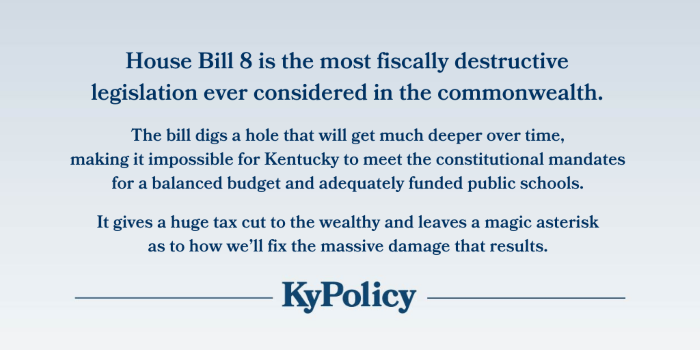House Bill 8, which passed the Kentucky House last week, is the most fiscally destructive legislation ever considered in the commonwealth. It tries to get something for nothing by phasing out the income tax, which generates 40% of state revenue, without providing a way to pay for it.
The bill digs a hole that will get much deeper over time, making it impossible for Kentucky to meet the constitutional mandates for a balanced budget and adequately funded public schools, among other obligations. It gives a huge tax cut to the wealthy and leaves a magic asterisk as to how we’ll fix the massive damage that results.
House Bill 8 (HB 8) begins with a 20% cut in our income tax rate, from 5% to 4%. That cut alone will cost more than Kentucky spends on all of its universities and community colleges combined, and exceeds what the House set aside from the current surplus for one-time tax refunds. It then includes triggers to cut the tax rate by another 0.5 percentage points each time revenue exceeds arbitrary dollar levels, until the income tax is completely eliminated.
Revenue will naturally meet the bill’s trigger thresholds simply because of inflation. But as the inflation of today shows us, you can have more dollars that buy less stuff. State revenues are double what they were 20 years ago but government isn’t twice as big now — in fact, today we have 6,800 fewer state employees than we did back then, due to budget cuts after the Great Recession.
HB 8 doesn’t even try to replace the revenue lost by abolishing our largest source. It includes new taxes on an obscure list of services including security systems, event planning, taxis and ride-sharing services, and electric and hybrid vehicles. But those taxes raise just 10% of what we lose from the first reduction in the income tax alone, making them more a distraction than a solution.
The net result is a hole in our budget that will likely grow over a decade to what Kentucky spends on the entire Medicaid program, which provides health care to 1.5 million kids, seniors, low-income people and Kentuckians with disabilities. And the hole just gets much bigger from there.
When the other shoe drops, we’ll be forced to slash services dramatically, meaning laid-off teachers and social workers, worsening health crises, soaring student loan debt and much more.
There will be pressure to raise the regressive sales tax to fill the gap and apply it to currently exempt purchases like groceries, prescription drugs and utilities. But the way HB 8 is designed, those increases will just trigger additional income tax cuts, failing to raise new revenue while constituting a shift in which low- and middle-income people will pay more in taxes.
Wealthy people will be the only winners. A total of 65% of the tax cuts will go to the richest 20% of people, and 37% will go to the richest 5%, according to the Institute on Taxation and Economic Policy. The top 1% of Kentuckians will get $11,000 in tax cuts starting the first year and $55,000 annually when the income tax is eliminated.
It’s a mistake to think the growth fairy will reward Kentucky for HB 8 with jobs and population. That belief wreaked havoc in Kansas, which had to roll back its income tax cuts after just five years when they created a budget crisis. Arizona, North Carolina, Ohio, Maine and Wisconsin also cut their income taxes at the same time and had to make budget reductions after their economies grew slower than the national average.
Because Kentucky has a temporary budget surplus caused by federal aid, the day of reckoning on HB 8 will not happen this biennium. But the tab from eliminating 40% of our revenue will come due, and it’s huge. We’ll see shuttered schools, hospitals, state parks and child care centers; a sicker population unable to get the help they need; and basic systems we all rely on that are completely unable to function.
HB 8 goes far beyond giving away the surplus, creating a fiscal crisis in the near future that gets larger over time.
Cooler heads must prevail in the Senate. Kentuckians need the General Assembly to be fiscally responsible and meet its constitutional duties. And we need them to protect core investments in education, health care and other needs from being ravaged by tax cuts to the wealthy.
This column appeared in the Daily Independent on March 9, the Herald-Leader on March 10, the State Journal on March 18, and the Courier-Journal on March 23, 2022.




